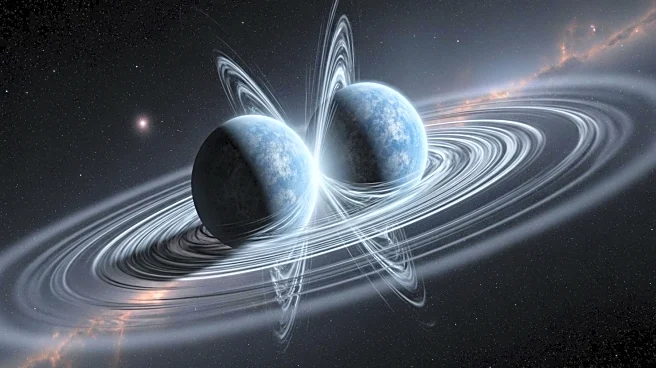What is the story about?
What's Happening?
The Laser Interferometer Gravitational-Wave Observatory (LIGO) has made significant strides in the field of astrophysics by detecting gravitational waves from massive black hole collisions. These findings, including the recent detection of GW231123, have challenged existing models of black hole formation. The GW231123 event involved a merger of black holes with masses 100 and 140 times that of the sun, resulting in a daughter black hole of approximately 225 solar masses. This discovery is particularly noteworthy as it contradicts standard stellar evolution models, which do not account for black holes of such mass. The LIGO-Virgo-KAGRA collaboration has detected over 300 gravitational wave signals since its inception, providing new insights into the universe's most extreme events.
Why It's Important?
These discoveries have profound implications for our understanding of black hole formation and the fundamental laws of physics. The detection of such massive black hole mergers suggests that these cosmic phenomena may form through successive mergers of smaller black holes, rather than through traditional stellar evolution. This challenges existing astrophysical models and could lead to a reevaluation of how black holes grow and evolve. Additionally, these findings support the theory that black holes are characterized by their mass, spin, and electric charge, as predicted by physicist John Wheeler's 'no hair' theorem. The ability to detect and analyze gravitational waves opens a new window for exploring the universe, complementing traditional light-based astronomy.
What's Next?
The LIGO-Virgo-KAGRA collaboration is expected to continue refining its detection capabilities, potentially leading to more frequent and detailed observations of gravitational wave events. Future detections could provide further evidence to support or refute current theories of black hole formation and evolution. The scientific community may also explore the possibility of mixed mergers involving neutron stars and black holes, which could offer additional insights into the life cycles of massive stars. As gravitational wave astronomy advances, it is likely to play an increasingly important role in our understanding of the cosmos.
Beyond the Headlines
The ethical and philosophical implications of these discoveries are significant, as they challenge our understanding of the universe and our place within it. The ability to detect gravitational waves also raises questions about the limits of human knowledge and the potential for future technological advancements. As we continue to explore the universe, these findings may inspire new generations of scientists and researchers to push the boundaries of what is possible.
















